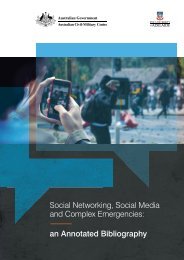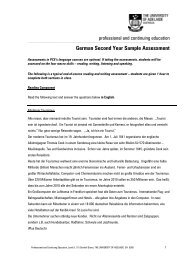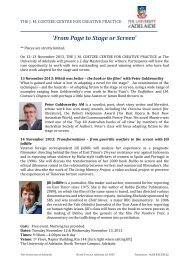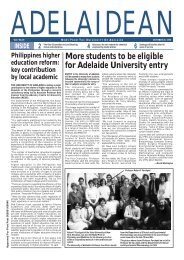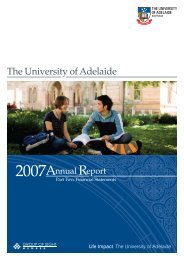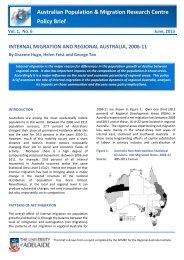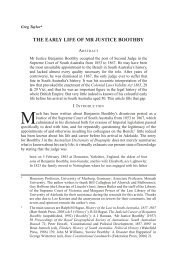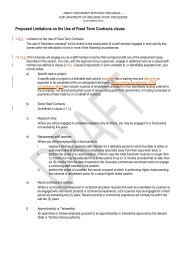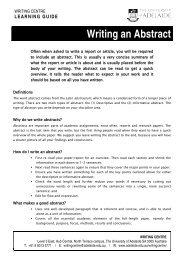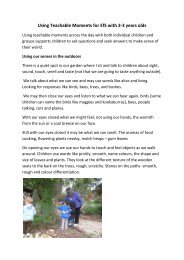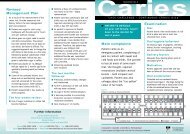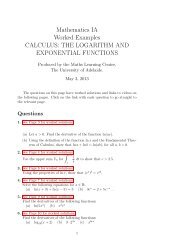Unbridling the Tongues of Women - The University of Adelaide
Unbridling the Tongues of Women - The University of Adelaide
Unbridling the Tongues of Women - The University of Adelaide
Create successful ePaper yourself
Turn your PDF publications into a flip-book with our unique Google optimized e-Paper software.
Faith and enlightenment<br />
<strong>of</strong> prestige in <strong>Adelaide</strong>. 42 Arthur Hardy and John Baker were not merely members,<br />
but <strong>of</strong>fice-bearers, in <strong>the</strong> exclusive <strong>Adelaide</strong> Club. Fur<strong>the</strong>rmore, as David Hilliard<br />
has pointed out, some <strong>of</strong> <strong>the</strong> more prominent politicians among <strong>the</strong>m (John Baker,<br />
for instance, and Sir William Morgan) also established close links with Anglican<br />
churches. 43 Most <strong>of</strong> <strong>the</strong> church members were engaged in businesses – ranging<br />
from hairdressing and photographic artistry, through wholesale grocery and ironmongery,<br />
to <strong>the</strong> management <strong>of</strong> mining companies from city <strong>of</strong>fices. 44 And <strong>the</strong>y<br />
prospered: <strong>the</strong> Simpson family’s rapid rise from a small safe and bedstead manufacturing<br />
business to wealth and social prominence <strong>of</strong>fered a Wakefieldian example to<br />
<strong>the</strong>ir fellow worshippers. 45 <strong>The</strong>se men may not have been members <strong>of</strong> <strong>the</strong> <strong>Adelaide</strong><br />
Racing Club, <strong>the</strong> <strong>Adelaide</strong> Hunt Club or <strong>the</strong> tennis, yachting and cricketing clubs<br />
which <strong>the</strong> more muscular wealthy established for <strong>the</strong>ir diversion, but <strong>the</strong>y were <strong>of</strong>fice-holders<br />
in such bodies as <strong>the</strong> Municipal Corporation <strong>of</strong> <strong>Adelaide</strong>, <strong>the</strong> Chamber<br />
<strong>of</strong> Commerce and <strong>the</strong> South Australian Horticultural and Floricultural Society. 46<br />
<strong>The</strong>se organisations contributed quite as much, if more formally, to <strong>the</strong> solidity<br />
with which bourgeois hegemony was established in South Australia. Members <strong>of</strong> a<br />
minority sect <strong>the</strong>y might have been, but <strong>the</strong>y had vested interests in maintaining<br />
<strong>the</strong> freedom, not only <strong>of</strong> worship, but also <strong>of</strong> financial enterprise which <strong>the</strong>y had<br />
gained in a new society. Woods’s ‘Enthusiasm <strong>of</strong> Humanity’ could be exercised very<br />
comfortably in <strong>Adelaide</strong>.<br />
For <strong>the</strong> women <strong>of</strong> <strong>the</strong> congregation, Woods’s teaching could simply have blended<br />
into <strong>the</strong> dominant conventions determining what women might and might not<br />
do, held by church and dissenting communions alike. As Margaretta Grieg reflected<br />
in England in <strong>the</strong> mid-19 th century: ‘A lady, to be such, must be a mere lady, and<br />
nothing else. She must not work for pr<strong>of</strong>it, or engage in any occupation that money<br />
can command …’. And Sarah Ellis, exhorting <strong>the</strong> Daughters <strong>of</strong> England in 1842,<br />
announced that, ‘As women, <strong>the</strong>n, <strong>the</strong> first thing <strong>of</strong> importance is to be content to<br />
be inferior to men – inferior in mental power, in <strong>the</strong> same proportion as you are inferior<br />
in bodily strength.’ 47 Unitarian women in <strong>Adelaide</strong> <strong>of</strong>ten did conform to such<br />
a view. <strong>The</strong>y taught in <strong>the</strong>ir church’s Sunday School, supported <strong>the</strong> Female Refuge,<br />
and raised funds for <strong>the</strong> <strong>Adelaide</strong> Children’s Hospital. 48 Emily Clark and Ca<strong>the</strong>rine<br />
Spence gave 20 years <strong>of</strong> voluntary work to a scheme designed to benefit destitute<br />
children. But some women from this congregation also did more, denying <strong>the</strong> patriarchal<br />
conventions with which such exponents as Ellis threatened <strong>the</strong>ir claim to<br />
bourgeois respectability. In <strong>the</strong> later decades <strong>of</strong> <strong>the</strong> 19 th century, Annie Martin estab-<br />
71



